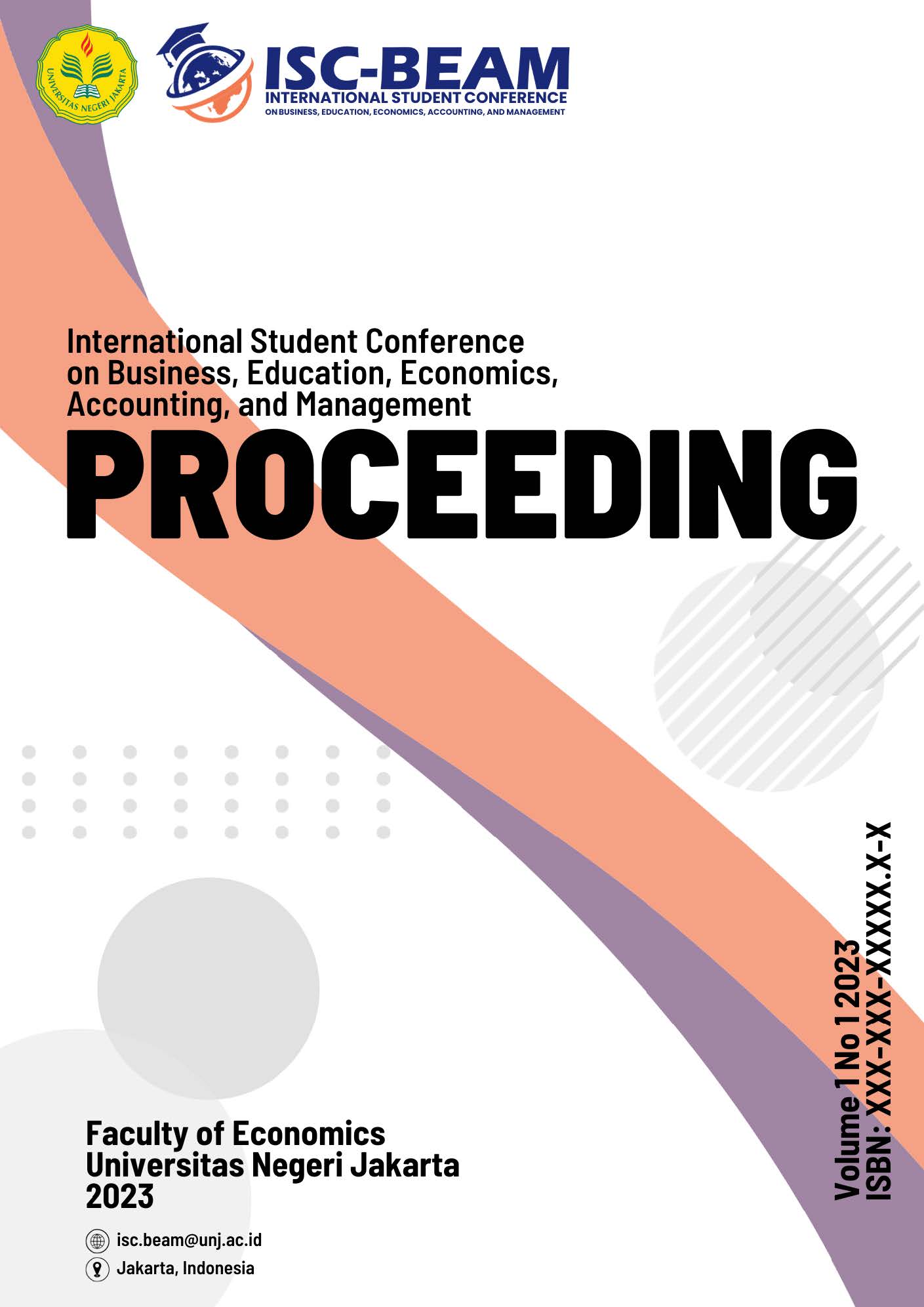The Role of the Green Economy in Economic Growth in Indonesia Based on an Islamic Economic Perspective
DOI:
https://doi.org/10.21009/ISC-BEAM.011.08Abstract
Over the past few years, the concept of a green economy has been recognized as a vital mechanism for achieving economic progress in both developed and emerging nations. This study aims to analyze the role of the green economy in Indonesia's economic expansion based on an Islamic economic perspective. The research methodology employs library analysis and content assessment. The data sources utilized in this study were gathered from previous research, articles, regulations, and reference literature pertaining to green economics, economic growth, and Islamic economics. The results denote that the green economy bears tremendous potential to support economic advancement in Indonesia under an Islamic economic lens. By applying key tenets such as the obligation to safeguard nature and the judicious utilization of resources, Indonesia can cultivate a development paradigm that is sustainable and beneficial across all societal strata. This research recommends that private and public sector entities continue endorsing and integrating green economy principles moving forward. Specifically, Islamic financial instruments can be directed toward eco-friendly investments like renewable energy, sustainable agriculture, green technologies, and environmentally-conscious infrastructure. Such participations from Islamic economics in "greening" the economy signify promising trajectories aligning ethical and sustainable finance. As the world grapples with urgent ecological crises, policy frameworks in Indonesia should incentivize collective societal and commercial transitions toward greener fiscal practices. Islamic finance with its underlying moral philosophy can potentially transform finance itself into an apparatus upholding both economic and environmental welfare.
References
Achyanadia, S. (2016). Peran Teknologi Pendidikan Dalam Meningkatkan Kualitas Sdm. Jurnal Teknologi Pendidikan, 5(1).
Aliyyah, R. R., Amini, A., Subasman, I., Herawati, E. S. B., & Febiantina, S. (2021). Upaya Meningkatkan Hasil Belajar Ipa Melalui Penggunaan Media Video Pembelajaran. Jurnal Sosial Humaniora, 12(1), 54–72.
Bahroini, N. F. (2018). Implementasi Pendidikan Karakter Pada Mata Pelajaran Produk Kreatif Dan Kewirausahaan Di Kelas Xi Jasa Boga Smk Negeri 7 Malang (Doctoral Dissertation, University Of Muhammadiyah Malang).
Batubara, M. D., Hamdani, Z., & Paderan, M. P. (2021). Google Classroom: A Learning Media In Increasing Students’ Motivation. Indonesian Journal of Learning Education and Counseling, 3(2), 164–169.
Budiastuti, P., Soenarto, S., Muchlas, M., & Ramndani, H. W. (2021). Analisis tujuan pembelajaran dengan kompetensi dasar pada rencana pelaksanaan pembelajaran dasar listrik dan elektronika di sekolah menengah kejuruan. Jurnal Edukasi Elektro, 5(1), 39-48.
Ghony, M. D. (2008). Penelitian tindakan kelas.
Hamalik, O. (2010). Teaching and learning process. Jakarta: PT. Earth Literacy.
Jannah, F. (2015). Inovasi pendidikan dalam rangka peningkatan kualitas pembelajaran melalui penelitian tindakan kelas. -, 1(1).
Lukki, Y., Mundung, B., & Manoppo, V. (2022). Pengaruh Lingkungan Kerja Dan Budaya Organisasi Terhadap Kinerja Karyawan Pt. Pln (Persero) Ap2b TOMOHON. Jurnal Manajemen Dan Bisnis, 7(2).
Maladerita, W., Sabetra, F., Falma, F. O., & Gistituati, N. (2022). Principal Leadership In Effort To Increase The Motivation Of The Teacher (A Case Study At Elementary School). International Journal Of Humanities Education and Social Sciences (IJHESS), 1(6).
Marcovitch, S., Jacques, S., Boseovski, J. J., & Zelazo, P. D. (2008). Self‐reflection and the cognitive control of behavior: Implications for learning. Mind, Brain, and Education, 2(3), 136-141.
Mulyaningsih, I. E. (2014). Pengaruh interaksi sosial keluarga, motivasi belajar, dan kemandirian belajar terhadap prestasi belajar. Jurnal Pendidikan Dan Kebudayaan, 20(4), 441–451.
Murni, N. S., Malaka, T., & Zulkarnain, M. (2011). Analysis Of Levels Of Lead (Pb) In Semen And Sperm Motility At The Laboratory Of Medical Biology Faculty Of Medicine, University Of Sriwijaya Palembang. Of the International Seminar, 3, 407.
Prastowo, A. (2017). Menyusun Rencana Pelaksanaan Pembelajaran (RPP) Tematik Terpadu: Implementasi Kurikulum 2018 Untuk SD/MI. Kencana.
Pritasari, O. K., Puspitorini, A., & Dewi, L. (2020). The Role of Skills Lab in Improving the Essential Skills and Motor Compete of Students in Cosmetology Program. International Joint Conference on Arts and Humanities (IJCAH 2020), 1303–1309.
Puspitarini, Y. D., & Hanif, M. (2019). Using Learning Media to Increase Learning Motivation in Elementary School. Anatolian Journal of Education, 4(2), 53–60.
Rahman, M., Abd, J., Ismail, M., Hj, A., & Nasir, M. (2014). Development and Evaluation of the Effectiveness of Computer-Assisted Physics Instruction. International Education Studies, 7(13), 14–22.
Razak, F. (2016). The effect of cooperative learning on mathematics learning outcomes viewed from students’ learning motivation. JRAMathEdu (Journal of Research and Advances in Mathematics Education), 1(1), 49–55.
Ridwan, S. (2003). Metode & Teknik Menyusun Proposal Penelitian. Bandung: Alfabeta.
Rohida, L. (2018). Pengaruh era revolusi industri 4.0 terhadap kompetensi sumber daya manusia. Jurnal Manajemen Dan Bisnis Indonesia, 6(1), 114-136.
Royani, I., Mirawati, B., & Jannah, H. (2018). Pengaruh model pembelajaran langsung berbasis praktikum terhadap keterampilan proses sains dan kemampuan berpikir kritis siswa. Prisma Sains: Jurnal Pengkajian Ilmu Dan Pembelajaran Matematika Dan IPA IKIP Mataram, 6(2), 46–55.
Sagala, S. (2005). Concepts and Meanings of Learning: To Help Solve Learning and Teaching Problems. Bandung: CV. Afabeta.
Septiani, A., & Rustaman, N. Y. (2017). Implementation of performance assessment in STEM (Science, Technology, Engineering, Mathematics) education to detect science process skill. Journal of Physics: Conference Series, 812(1), 12052.
Setiyanti, A., & Nur, Z. A. (2021). The Use of Audio Visual Media As an Effort to Increase Student Motivation in Aqidah Akhlak Subjects. Misykat Al-Anwar Jurnal Kajian Islam Dan Masyarakat, 4(1), 33–42.
Sudjana, N. (1989). Penilaian Hasil Proses Belajar Mengajar. Bandung: Remaja Rosdakarya.
Tamamala, S., Setiawan, A., & Nursalim, N. (2020). The Implementation of Ice Breaking to Increase Students Motivation in English Learning at Yamueti Kokoda. INTERACTION: Jurnal Pendidikan Bahasa, 7(2), 53–62.
Usman, M. U. (1993). Metodologi Penelitian Sosial. Bandung: Bumi Aksara
Wijaya, C., Syahrum, S., & Ananda, R. (2013). Penelitian tindakan kelas: melejitkan kemampuan penelitian untuk meningkatkan kualitas pembelajaran guru.
Wulan, A. R. (2003). PERMASALAHAN YANG DIHADAPI DALAM PEMBERDAYAAN PRAKTIKUM BIOLOGI DI SMU DAN UPAYA PENANGGULANGANNYA: Penelitian Tindakan Kelas Kolaboratif dengan menggunakan Asesmen Bervariasi pada siswa dan Asesmen Portofolio pada guru. Universitas Pendidikan Indonesia.
Yudianto, A. (2017). Penerapan video sebagai media pembelajaran.






